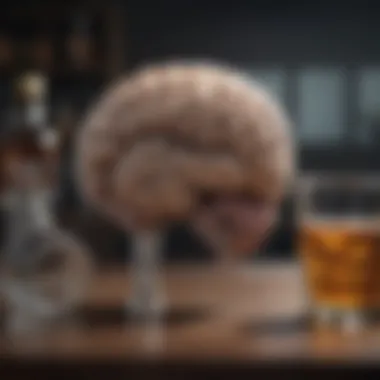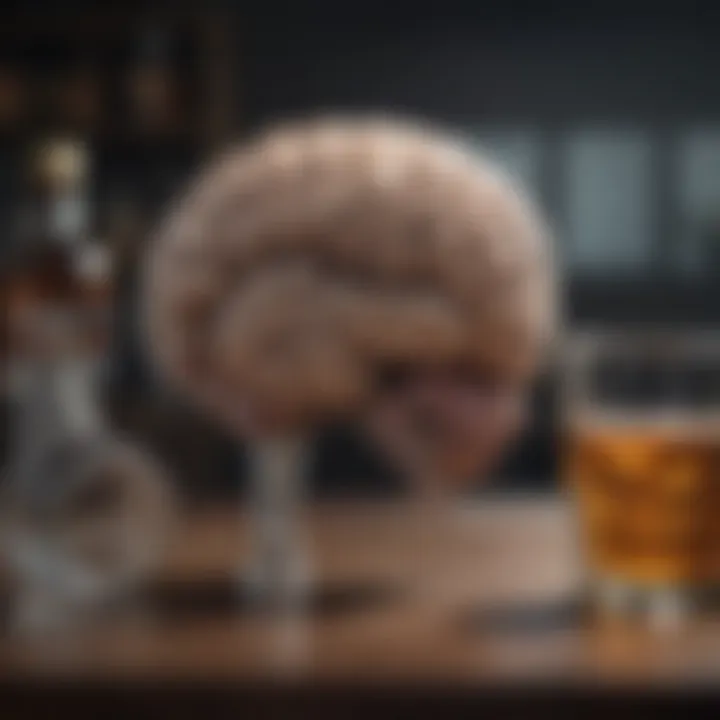Understanding Alcoholic Brain Injury: Causes & Effects


Intro
Alcoholic brain injury is a serious public health issue that can have profound and lasting effects on individuals. Chronic alcohol consumption can lead to a range of neurological impairments, which often go unnoticed until they significantly impact daily functioning. Understanding the intricacies of these injuries is crucial for medical professionals, researchers, and anyone affected by such conditions. Alcohol can cause structural and functional changes in the brain, which can manifest as cognitive deficits, emotional disturbances, and difficulties in social interactions.
Exploring this topic not only sheds light on the causes behind these injuries but also emphasizes the significance of rehabilitation and recovery pathways. This guide seeks to provide a comprehensive overview of alcoholic brain injury, informing the audience about its effects on individuals' lives and the potential strategies for healing and support.
Key Concepts and Terminology
Definition of Key Terms
- Alcohol-Related Brain Injury: Neurological impairments caused by the prolonged consumption of alcohol.
- Cognitive Impairment: A reduction in mental functions such as memory, attention, and problem solving.
- Rehabilitation: A process aimed at restoring or improving abilities that have been impaired.
- Wernicke-Korsakoff Syndrome: A severe neurological disorder associated with chronic alcohol use, characterized by confusion and memory loss.
Concepts Explored in the Article
This article delves into several critical concepts related to alcoholic brain injury:
- The mechanisms of brain damage linked to alcohol consumption.
- Risk factors contributing to the likelihood of developing these injuries.
- Diagnostic criteria used to identify different forms of brain injury related to alcohol.
- The impact on cognitive and emotional functions, detailing how everyday life can be affected.
- Various treatment strategies and rehabilitation approaches, integrating research findings and expert opinions for an informed perspective.
Findings and Discussion
Main Findings
Research indicates that chronic alcohol consumption can lead to significant brain structural changes. Key findings include:
- Shrinkage of Brain Volume: Prolonged drinking results in decreased brain mass, particularly affecting the frontal lobes which are critical for cognitive processes.
- Impaired Neurogenesis: Alcohol disrupts the production of new neurons, impacting memory and learning capabilities.
- Emotional Dysregulation: Many individuals with alcoholic brain injury struggle with mood swings and emotional instability.
Potential Areas for Future Research
Future research should focus on the following:
- Developing more effective rehabilitation strategies tailored to individual needs.
- Exploring new treatment options that target neuroplasticity and cognitive recovery.
- Investigating the long-term impact of early intervention on brain health.
"Understanding the complexities of alcoholic brain injury is not just an academic pursuit; it is essential for healing and support for those affected."
The article aims to not only highlight these findings but also provide practical insights into the implications they have for rehabilitation strategies. A clear understanding of how these injuries manifest and are treated will enhance the effectiveness of recovery efforts.
Intro to Alcoholic Brain Injury
Understanding alcoholic brain injury is crucial in the realm of neurology and substance abuse studies. Chronic alcohol consumption can lead to a plethora of neurological impairments, impacting an individual's cognitive and emotional well-being. This section aims to shed light on the definitions and historical context of alcoholic brain injury. Examining these elements provides a framework to understand later discussions on mechanisms, risk factors, and rehabilitation strategies.
Definition and Overview
Alcoholic brain injury refers to a range of conditions that arise from the neurotoxic effects of alcohol on the central nervous system. This can include Wernicke-Korsakoff syndrome, alcohol-related dementia, and cerebellar degeneration. Each of these conditions presents unique symptoms but is fundamentally anchored in the pathways of alcohol-induced brain damage.
Key aspects of alcoholic brain injury include:
- Decreased neurogenesis: Chronic alcohol consumption reduces the production of new neurons, particularly in the hippocampus, affecting learning and memory.
- Cognitive impairments: Individuals may experience deficits in attention, problem-solving, and executive function.
- Emotional dysregulation: Alcohol can lead to increased anxiety, depression, and other emotional disturbances.
Recognizing the definition and nuances of these terms is essential for professionals who seek to address the challenges posed by this condition.
Historical Context of Alcoholic Brain Injury
Understanding the historical context of alcoholic brain injury involves exploring how perceptions and knowledge surrounding this issue have evolved. Historically, alcohol-related disorders were often overshadowed by societal stigma and misunderstandings regarding addiction.
The identification of Wernicke-Korsakoff syndrome as a specific condition can be traced back to the early 20th century. The works of neurologist Carl Wernicke and psychiatrist Sergei Korsakoff laid the groundwork for acknowledging the effects of thiamine deficiency caused by excessive alcohol intake. Their research was pivotal in shifting the focus towards understanding the neurological aspects of alcohol abuse.
Over the years, more has been discovered about how alcohol impacts the brain at both the structural and functional levels. The acknowledgment of these conditions has gradually led to improvements in diagnostic criteria and treatment approaches. It is crucial for current researchers and healthcare professionals to build on this historical knowledge to mitigate the effects of alcoholic brain injury effectively.
"Understanding the evolution of our knowledge about alcoholic brain injury assists in both clinical practices and the development of effective treatment regimes."
This realization underscores the importance of continuous research and education regarding the implications of alcohol consumption on neurological health.
Mechanisms of Alcohol-Induced Brain Damage
Understanding the mechanisms behind alcohol-induced brain damage is crucial for comprehending how chronic alcohol consumption affects neurological functions. Alcohol's impact on the brain is not uniform; it varies across individuals and depends on several factors such as the amount of alcohol consumed, duration of use, and individual biology. This section explores the neurochemical effects, structural changes in the brain, and the roles of inflammation and oxidative stress in alcoholic brain injury.
Neurochemical Effects of Alcohol
Alcohol alters neurotransmitter systems in the brain. The primary effects occur through the gamma-aminobutyric acid (GABA) and glutamate systems. GABA is inhibitory, while glutamate is excitatory. When alcohol is consumed, it enhances GABA activity, leading to a sedative effect. Conversely, alcohol inhibits glutamate, which affects cognitive functions.


Over time, chronic exposure to alcohol can cause the brain to adapt. This adaptation leads to changes in receptor density and sensitivity. For instance, individuals may experience increased excitatory signaling when not consuming alcohol, leading to withdrawal symptoms. Additionally, neurotransmitters such as dopamine, which play a role in reward and motivation, are significantly affected. This dysregulation contributes to both addiction and cognitive deficits associated with alcoholic brain injury.
Structural Changes in the Brain
Alcohol consumption induces various structural changes in the brain. Studies show that chronic use is linked to a reduction in brain volume, particularly in the frontal and temporal lobes. These areas are critical for executive functions, memory, and emotional regulation.
Magnetic Resonance Imaging (MRI) studies often reveal a shrunken hippocampus in individuals with alcohol use disorders. The hippocampus is essential for memory formation, and its impairment leads to significant cognitive deficits.
Neurons may also undergo morphological changes, diminishing their ability to communicate effectively. The white matter integrity shows damage, which affects connectivity between different brain regions, further exacerbating cognitive issues.
Inflammation and Oxidative Stress
Chronic alcohol consumption is associated with increased neuroinflammation and oxidative stress. When alcohol is consumed, it activates microglia, the immune cells in the brain. This activation can lead to a chronic inflammatory state, damaging neurons and supporting cells.
Oxidative stress occurs when there is an imbalance between free radicals and antioxidant defenses. Alcohol metabolism generates harmful free radicals, which can damage cellular components, including lipids, proteins, and DNA. This process has been linked to cell death and neurodegeneration.
Overall, both inflammation and oxidative stress contribute significantly to the decline in cognitive function and increase the risk of neurodegenerative diseases in alcohol-dependent individuals.
Chronic neuroinflammation and oxidative stress are key elements in the pathogenesis of alcohol-related brain damage.
In summary, the mechanisms of alcohol-induced brain damage encompass a complex interplay of neurochemical alterations, structural changes, and detrimental inflammatory processes. Each of these factors contributes to cognitive and emotional impairments observed in individuals suffering from alcoholic brain injury.
Types of Alcoholic Brain Injury
Understanding the types of alcoholic brain injury is crucial for both diagnosis and treatment. Each type presents unique symptoms and challenges, affecting individuals differently depending on various factors. This article will detail the primary conditions associated with alcoholic brain injury, providing clarity on their significance and impact on cognitive and emotional well-being.
Wernicke-Korsakoff Syndrome
Wernicke-Korsakoff Syndrome (WKS) is a severe neurological disorder caused by thiamine (vitamin B1) deficiency, commonly associated with chronic alcohol misuse. The syndrome is divided into two stages: Wernicke's encephalopathy and Korsakoff syndrome. Wernicke's encephalopathy manifests with symptoms like confusion, unsteadiness, and eye movement abnormalities. If unchecked, it can progress to Korsakoff syndrome, which is characterized by significant memory deficits and confabulation.
Wernicke-Korsakoff Syndrome is often misdiagnosed as dementia due to overlapping symptoms, making accurate assessment vital for appropriate treatment.
Alcohol-Related Dementia
Alcohol-related dementia is a form of cognitive decline that arises from long-term excessive alcohol consumption. It is characterized by memory loss, impaired problem-solving abilities, and difficulty with coordination. This condition reflects both the neurotoxic effects of alcohol and its impact on overall brain function.
Researchers find that patients may experience changes in mood and behavior as cognitive functions deteriorate. Identifying this type of dementia is crucial, as it is potentially reversible if alcohol consumption ceases and proper medical care is initiated.
Cerebellar Degeneration
Cerebellar degeneration refers to the decline of the cerebellum, the area of the brain responsible for coordination and balance. Chronic alcohol use can lead to atrophy in this region, resulting in symptoms such as unsteady gait, tremors, and difficulty with fine motor skills. This injury can severely impact an individual's ability to perform daily activities and may lead to isolation due to physical limitations.
Understanding cerebellar degeneration is essential for both prevention and rehabilitation strategies, as early intervention may help to mitigate some effects and improve quality of life.
Risk Factors for Alcoholic Brain Injury
Understanding the risk factors for alcoholic brain injury is crucial for identifying individuals who may be more susceptible to the negative effects of alcohol on the brain. These factors can guide prevention strategies and inform clinical approaches to treatment. Each risk element contributes differently to the likelihood of developing brain injuries related to alcohol consumption.
Genetic Predisposition
Genetic factors play a significant role in how individuals metabolize alcohol and their susceptibility to its harmful effects. Certain genetic variations can alter enzyme activity involved in alcohol metabolism, leading to increased toxicity in the brain. For example, some people possess a genetic variant that reduces the efficiency of the enzyme aldehyde dehydrogenase, resulting in higher levels of acetaldehyde after drinking. This not only causes unpleasant physical reactions but also indicates a higher risk for brain injury over time.
Research has shown that family history of alcohol dependence can also be a predictor of personal risk. Individuals with a parent or sibling who struggled with alcohol use disorder may face heightened chances of developing similar issues.
Environmental and Social Influences
Environmental and social factors are equally important in understanding alcoholic brain injury. These factors can create situations where alcohol consumption becomes more likely or problematic. Living in a community with high rates of alcohol use or having social circles that normalize heavy drinking can increase risks significantly.
Moreover, economic conditions, such as poverty or lack of access to healthcare, can limit an individual's options for receiving help. Studies show that people from disadvantaged backgrounds may engage in drinking as a coping mechanism, further exacerbating their risk of brain injury.
Co-Occurring Mental Health Disorders
The presence of co-occurring mental health disorders greatly increases the risk for individuals vulnerable to alcoholic brain injury. Conditions such as depression, anxiety, and post-traumatic stress disorder often lead individuals to self-medicate with alcohol, which increases the likelihood of developing brain-related impairments. These disorders not only make it challenging to refrain from alcohol consumption but also complicate treatment outcomes.
Having a dual diagnosis necessitates a tailored approach to rehabilitation, as conventional drunk treatment may not suffice. Such complexity highlights the importance of addressing both the addiction and the underpinning mental health issues in a comprehensive manner.
"The interplay between genetic, social, and mental health factors offers a complex landscape of risk that requires careful navigation for effective intervention."
In summary, recognizing these risk factors for alcoholic brain injury is vital. By understanding the interplay of genetic predisposition, environmental influences, and co-occurring disorders, healthcare providers can develop more effective prevention and treatment strategies. This holistic approach assists in creating a framework that addresses not just the symptoms, but the underlying causes as well.
Diagnostic Approaches


Understanding the different diagnostic approaches for alcoholic brain injury is crucial. Early and accurate diagnosis directly influences treatment efficacy and rehabilitation outcomes. With the complex nature of how alcohol impacts the brain, medical professionals must utilize a variety of techniques to assess both physical and cognitive impairments effectively.
Clinical Assessment Techniques
In a clinical setting, healthcare providers often begin with a thorough patient history and physical examination. This process helps to understand the extent of alcohol use and the presence of any associated symptoms. During the assessment, clinicians may use standardized questionnaires to evaluate cognitive functions, emotional states, and potential neurological deficits. Such tools include the Mini-Mental State Examination (MMSE) and the Montreal Cognitive Assessment (MoCA), which are widely recognized for assessing cognitive decline and identifying areas of concern.
Moreover, collaboration with multidisciplinary teams including neurologists, psychiatrists, and social workers can provide a more holistic view of the patient’s condition, ensuring that all aspects of the injury are considered. These clinical assessments serve as a foundation for subsequent diagnostic procedures and are essential in forming an appropriate treatment plan.
Neuroimaging and Its Role
Neuroimaging plays a significant role in diagnosing alcoholic brain injury. Techniques such as Magnetic Resonance Imaging (MRI) and Computed Tomography (CT) scans allow clinicians to visualize structural changes in the brain that may result from chronic alcohol consumption. These tools can highlight areas of atrophy or degeneration, particularly in regions critical for memory and coordination.
Besides structural imaging, functional imaging techniques such as Positron Emission Tomography (PET) or functional MRI (fMRI) can help assess the metabolic activity of brain regions. This information is valuable in detailing how alcohol impacts brain function, thereby guiding treatment decisions. Neuroimaging serves not only as a diagnostic tool but also as a means of monitoring the effectiveness of therapeutic interventions over time.
Assessment of Cognitive Functions
Assessing cognitive functions in individuals suffering from alcoholic brain injury is vital. Cognitive tests can identify deficits in memory, attention, and executive function. These assessments often include tasks that evaluate short-term memory retention and problem-solving capabilities.
It is also important to consider the psychological aspect of these assessments. Patients might exhibit emotional dysregulation alongside cognitive impairment, which can further complicate their condition. Therefore, incorporating psychological assessments is necessary to give a comprehensive view of the individual’s cognitive capabilities.
The valuation of cognitive functions can significantly influence rehabilitation strategies and outcomes, tailoring interventions to specific cognitive deficits and emotional needs.
Understanding the full impact of alcoholic brain injury relies on utilizing a variety of diagnostic approaches. This blend of clinical assessments, neuroimaging, and cognitive evaluations allows for a more complete picture of the patient's condition, fostering a tailored and effective recovery process.
Cognitive and Emotional Impact
Understanding the cognitive and emotional impact of alcoholic brain injury is crucial for comprehending its full scope. Chronic alcohol consumption does not only affect physical health but significantly alters cognitive abilities and emotional well-being. These impacts can create barriers to recovery, hinder rehabilitation efforts, and complicate social relationships. Addressing these cognitive and emotional aspects is essential for developing effective treatment strategies and support systems tailored to individual needs.
Memory and Learning Deficits
One of the most profound effects of alcoholic brain injury is on memory and learning. Individuals often experience significant impairments in short-term and long-term memory. This can manifest as difficulty recalling recent events, recognizing familiar faces, or maintaining new information.
The impact on learning can be equally damaging. Tasks that require processing new information or developing skills can become challenging. For students or professionals, this poses severe limitations and can affect their academic or career trajectories.
Brain regions such as the hippocampus, which plays a key role in memory processes, are particularly vulnerable to alcohol's effects. Research indicates that excessive alcohol consumption may lead to structural changes in these areas, contributing to memory deficits. Thus, cognitive rehabilitation focused on memory techniques can aid recovery, such as using mnemonic devices or structured learning tasks.
Emotional Dysregulation
Emotional dysregulation is another critical area of concern. People suffering from alcoholic brain injury may find it hard to manage their emotions. Common symptoms include heightened anxiety, irritability, and episodes of mood swings. Those affected can struggle with recognizing their feelings and may react disproportionately to situations.
This emotional instability often stems from the neurobiological changes induced by alcohol. Neurotransmitters such as serotonin and dopamine may be disrupted, affecting mood regulation. This can lead to a cycle where emotional challenges exacerbate substance use. Treatment plans should include strategies for emotional regulation, such as cognitive-behavioral therapy or mindfulness practices.
Social Implications and Relationships
The cognitive and emotional impacts of alcoholic brain injury extend into social interactions and relationships. Individuals may experience trouble in their personal lives due to misunderstandings or difficulties in social communication. It can feel isolating, leading to withdrawal from social activities and relationships that once provided support.
Family members and friends can also be affected, as they may not fully understand the changes in behavior or cognition. Educational resources and support groups for families are vital to address these dynamics.
To mitigate these issues, therapy that focuses on social skills training can be beneficial. These therapeutic interventions help individuals practice effective communication and develop their social networks, fostering a supportive environment for recovery.
In summary, the cognitive and emotional consequences of alcoholic brain injury are multifaceted. Recognizing and addressing these impacts is essential for improving quality of life and facilitating effective rehabilitation.
Rehabilitation and Treatment Options
Rehabilitation and treatment options play a pivotal role in addressing alcoholic brain injury. The consequences of chronic alcohol use can be profound, affecting various cognitive and emotional domains. Effective treatment not only helps individuals reclaim their lives but also assists them in achieving long-term recovery. Key areas of focus include detoxification, cognitive rehabilitation, and psychosocial support systems. Each component contributes uniquely toward restoring an individual’s well-being and enhancing quality of life.
Detoxification and Early Intervention
Detoxification represents the first step in the treatment of alcoholic brain injury. It involves the process of eliminating alcohol from the body while managing withdrawal symptoms. Early intervention is essential, as it allows for a swift response to both physical and psychological dependencies associated with alcohol use. The benefits of detoxification extend beyond physical health; it can stabilize mood and lead to clearer cognitive functions. Medical supervision during detoxification is critical, as withdrawal can trigger severe complications, including seizures. Patients may require medications such as benzodiazepines to ease discomfort and reduce risks. Furthermore, supportive care during this phase helps create an environment conducive to recovery.
Cognitive Rehabilitation Techniques
Cognitive rehabilitation techniques are crucial in helping individuals regain cognitive functions impacted by alcohol abuse. These techniques target memory, attention, and problem-solving skills through structured exercises and therapies. Individualized therapies enable practitioners to customize programs based on specific deficits observed in patients. For example, memory-enhancing techniques often utilize repetition and visual aids to reinforce learning and recall. Cognitive-behavioral therapy (CBT) serves as an effective method to help patients cope with emotional challenges and modify negative thought patterns. Additionally, engaging patients in activities that promote cognitive engagement, such as puzzles or strategic games, can stimulate brain function. Ultimately, cognitive rehabilitation can enhance daily functioning and foster independence in patients.
Psychosocial Support Systems
Psychosocial support systems form an integral part of the recovery process for individuals dealing with alcoholic brain injury. This type of support addresses the social and emotional needs of individuals, fostering connections with peers, family, and professionals. Support groups, such as Alcoholics Anonymous, offer a sense of community where individuals can share experiences and encourage one another. Moreover, family counseling can help family members understand the nature of the injury. This understanding cultivates empathy and improves relationships, which are often strained due to alcohol-related issues. Access to mental health professionals provides additional guidance, helping patients navigate feelings of guilt, shame, or depression that may accompany their condition. Establishing a robust support system not only aids in recovery but also promotes long-term sobriety, reducing the risk of relapse.
These approaches to rehabilitation highlight the multifaceted nature of recovery from alcoholic brain injury. Success often hinges on a combination of medical treatment, cognitive rehabilitation, and psychosocial support.
Current Research Trends


Research related to alcoholic brain injury has evolved significantly in recent years, driven by the need to understand the complex interactions between chronic alcohol consumption and neurological health. The importance of examining current research trends stems from their potential to inform treatment options and preventive measures, ultimately benefiting individuals who are affected by these conditions. Through a comprehensive evaluation of emerging studies, this section aims to elucidate the latest findings and how they can be integrated into clinical practice.
Innovative Therapeutic Approaches
The pursuit of innovative therapeutic approaches is paramount in addressing the diverse manifestations of alcoholic brain injury. Recent studies highlight the exploration of pharmacological interventions, such as the use of antioxidants to mitigate oxidative stress or medications like disulfiram to reduce cravings. These treatments aim to protect against the neuronal damage caused by alcohol and promote recovery of cognitive functions.
In addition to medications, non-invasive brain stimulation techniques such as Transcranial Magnetic Stimulation (TMS) show promise in enhancing cognitive recovery. These techniques may help in re-establishing neural connections disrupted by long-term alcohol abuse. Therapies that combine nutrition counseling and physical rehabilitation are also being researched, focusing on holistic recovery strategies.
Longitudinal Studies and Findings
Longitudinal studies play a crucial role in understanding the long-term impacts of alcohol on brain health. Ongoing research observes patients over extended periods to assess cognitive decline, emotional well-being, and overall quality of life. Such studies provide invaluable insights into how early interventions can alter the trajectory of brain injury progression.
Findings from longitudinal studies consistently demonstrate that sustained abstinence from alcohol leads to significant cognitive improvements over time. For instance, participants who abstained for one year often displayed enhanced memory functions and reduced mood disturbances compared to those who remained active drinkers. This reinforces the necessity for continuous support and monitoring for individuals recovering from alcohol dependence.
Case Studies and Emerging Evidence
Case studies add a personalized dimension to research on alcoholic brain injury. They provide real-world examples of how individuals experience various symptoms and respond to treatment. Recent case studies indicate that integrated approaches that involve both cognitive rehabilitation and psychosocial support yield positive outcomes for affected individuals.
Additionally, emerging evidence highlights the relevance of personalized medicine, suggesting that genetic factors can influence how a person may respond to specific treatments. Research continues to investigate the potential for tailoring rehabilitation programs based on genetic profiles, thus enhancing recovery rates and improving the overall experience of those affected.
"Understanding how individual differences affect treatment response can lead to more effective interventions and improved long-term outcomes for individuals suffering from alcoholic brain injury."
This exploration of case studies is essential, offering insights into the varying pathways of recovery and the importance of adaptability in treatment protocols. Together with the findings of longitudinal studies, these elements contribute to a richer understanding of the diverse impacts of alcohol on the brain and underscore the importance of ongoing research in identifying effective interventions.
Preventive Strategies
Preventive strategies play a crucial role in mitigating the effects of alcoholic brain injury. They encompass a range of initiatives that target education, awareness, and community involvement to reduce the incidence of alcohol-related neurological issues. Understanding these strategies is important because they emphasize proactive approaches, rather than solely focusing on treatment after brain injury has occurred.
Public Health Initiatives
Public health initiatives are vital in shaping the narrative around alcohol consumption and its impact on health. These programs aim to reduce the prevalence of alcohol abuse through various methods, including:
- Awareness Campaigns: These campaigns inform the public about the dangers of excessive drinking, aiming to create a more informed society that understands the risks.
- Screening Programs: Implementing routine screenings in healthcare settings can help identify individuals at risk of alcohol-related brain injury early. This allows for prompt intervention and support.
- Policy Advocacy: Health organizations often spearhead efforts to influence policy changes, such as stricter alcohol licensing laws and restrictions on advertising. These measures can reduce the accessibility of alcohol, particularly for young people.
By addressing the issue from multiple angles, public health initiatives serve as a foundational step towards preventing alcoholic brain injury.
Education and Awareness Programs
Education and awareness programs specifically target youth and adults to create a solid understanding of the consequences of alcohol consumption. Such programs often include:
- School-Based Curriculums: Implementing educational modules on the effects of alcohol in schools can raise awareness among students. Programs like these encourage critical thinking about alcohol use and its long-term effects.
- Community Workshops: Workshops in community centers or workplaces can provide valuable resources to understand the signs of alcohol misuse. They facilitate discussions on alcohol's effects, promoting a culture of support.
- Digital Media Campaigns: With the rise of social media, effective campaigns can share facts about alcohol-related brain injury. Engaging content can help spread awareness and encourage individuals to make informed decisions about drinking.
These programs build a knowledge base that empowers individuals to make healthier choices and reinforces community support.
Family and Community Support Networks
Family and community support networks are essential for individuals struggling with alcohol issues. They provide a safety net and foster healthy environments conducive to recovery. These networks include:
- Peer Support Groups: Groups like Alcoholics Anonymous offer a platform for sharing experiences. They create an environment where individuals feel understood and supported.
- Family Counseling: Engaging families in the treatment process can enhance support for those affected by alcohol use. Family counseling sessions help educate families about the nature of alcohol dependence and its effects on the brain.
- Community Resources: Local organizations can provide information about available treatment programs and mental health resources, ensuring those in need have access to care.
By fostering a sense of belonging, these support networks can significantly affect recovery outcomes and encourage healthier lifestyle choices.
"Preventive strategies not only aim to reduce the incidence of alcohol-related brain injury but also foster a healthier society as a whole."
Closure and Future Directions
Understanding alcoholic brain injury is crucial for recognizing its intricate nature. This section highlights the significance of the findings discussed throughout the article. It sheds light on the multifaceted effects of alcohol on the brain and emphasizes the importance of awareness in both medical and public health spheres. Knowledge of the conditions associated with alcoholic brain injury can lead to earlier interventions and improved recovery outcomes for affected individuals.
Alcoholic brain injuries present various challenges not only to the individuals suffering from them but also to their families and society at large. This understanding prompts the need for comprehensive rehabilitation strategies. These strategies should encapsulate not only detoxification and cognitive rehabilitation but also psychosocial support, adapting to the diverse needs of those in recovery.
Future directions in research are vital. There is a constant need for examining the long-term effects of alcohol-induced neurological damage, exploring innovative treatment methods, and understanding the interactions of genetics and environment in developing these conditions.
"A holistic approach should integrate medical treatment with emotional support and societal reintegration strategies."
Summary of Key Points
The exploration of alcoholic brain injury reveals critical insights, such as:
- The neurochemical impacts of alcohol leading to cognitive impairments.
- Various types of brain injury, including Wernicke-Korsakoff Syndrome, which demand specific attention.
- Risk factors such as genetics and co-occurring mental health disorders that influence the severity of conditions.
- The importance of diagnostic techniques, like neuroimaging, to accurately assess brain injuries.
- Rehabilitation should be multifaceted, encompassing detoxification, cognitive techniques, and social support.
Implications for Future Research
Future research should focus on several key areas to deepen the understanding of alcoholic brain injury:
- Longitudinal Studies: These studies are essential for tracking the progression of brain injury over time, which may reveal patterns that influence prevention and intervention strategies.
- Innovative Treatments: Investigating new approaches, including pharmacological therapies or non-invasive brain stimulation techniques, offers hope for more effective rehabilitation.
- Psychosocial Dynamics: Understanding how social environments and psychological factors affect recovery can lead to better support frameworks.
- Genetic Studies: Studying individuals with genetic predispositions may help identify at-risk populations and tailor preventive measures.
Engagement in these research areas will not only enhance clinical practices but also inform public health initiatives that aim to mitigate the ramifications of alcohol on brain health.







